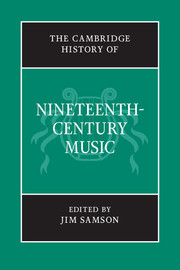Book contents
- Frontmatter
- Part One 1800–1850
- 1 The musical work and nineteenth-century history
- 2 Music And the rise of aesthetics
- 3 The profession of music
- 4 The opera industry
- 5 The construction of Beethoven
- 6 Music and the poetic
- 7 The invention of tradition
- 8 Choral music
- 9 The consumption of music
- 10 The great composer
- Part Two 1850–1900
- Chronology
- Institutions
- Personalia
- Index
- References
6 - Music and the poetic
from Part One - 1800–1850
Published online by Cambridge University Press: 28 March 2008
- Frontmatter
- Part One 1800–1850
- 1 The musical work and nineteenth-century history
- 2 Music And the rise of aesthetics
- 3 The profession of music
- 4 The opera industry
- 5 The construction of Beethoven
- 6 Music and the poetic
- 7 The invention of tradition
- 8 Choral music
- 9 The consumption of music
- 10 The great composer
- Part Two 1850–1900
- Chronology
- Institutions
- Personalia
- Index
- References
Summary
A traditional assumption of historiography that musical trends followed those of the other arts after a lapse of time is hard to sustain with the burgeoning of Romanticism, a movement which among other things embraced the emerging category of the ‘poetic’. Pointers to Romanticism in literature of the 1770s isolate phenomena within a predominantly Classicistic culture; Goethe could write an Iphigenia auf Tauris as well as Faust. An early and important identification of the musically Romantic by the composer, jurist and man of letters E. T. A. Hoffmann (1776–1822) extended the definition back to include the instrumental music of Haydn and Mozart. The ‘poetic’ in music reflects a tendency to artistic synthesis outside the self-evidently synthetic field of theatre music: permeation of an artistic form by the values of another, or indeed by ideas normally considered beyond the realm of art, is traceable in song and in certain genres of instrumental music, but there is no need to assume that it alone constitutes the phenomenon of Romanticism, and its development is continuous with eighteenth-century opera, song and programme music.
Writing about Beethoven’s Fifth Symphony in 1810, Hoffmann argued that purely instrumental music, without programme or literary allusion, is quintessentially Romantic; he resisted pointing to developments in French opera, even before the Revolution, as precursors of Weber’s operas or, indeed, his own.
When music is spoken of as an independent art the term can properly apply only to instrumental music, which scorns all aid, all admixture of other arts – and gives pure expression to its own peculiar artistic nature. It is the most Romantic of all arts – one might almost say the only one that is purely Romantic … Music reveals to man an unknown realm, a world quite separate from the outer sensual world surrounding him, a world in which he leaves behind all feelings circumscribed by intellect in order to embrace the inexpressible.
- Type
- Chapter
- Information
- The Cambridge History of Nineteenth-Century Music , pp. 151 - 177Publisher: Cambridge University PressPrint publication year: 2001

